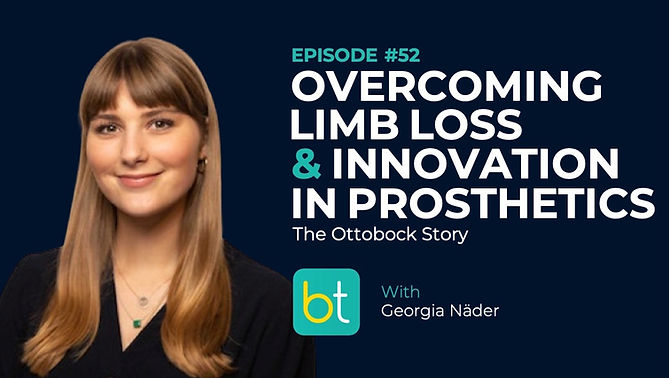BackTable / Innovation / Podcast / Episode #52
Overcoming Limb Loss with Innovation in Prosthetics: The Ottobock Story
with Georgia Näder
In this episode, host Dr. Diana Velazquez-Pimentel interviews Georgia Näder, Vice President of Futuring and Business Transition at Ottobock, a German prosthetics and orthotics company, on the history of the company, their innovation process, and what to look for in the future of Ottobock.
Be part of the conversation. Put your sponsored messaging on this episode. Learn how.

BackTable, LLC (Producer). (2023, May 19). Ep. 52 – Overcoming Limb Loss with Innovation in Prosthetics: The Ottobock Story [Audio podcast]. Retrieved from https://www.backtable.com
Stay Up To Date
Follow:
Subscribe:
Sign Up:
Podcast Contributors
Georgia Näder
Georgia Näder is the CEO of Ottobock, a German prosthetics and orthotics company
Dr. Diana Velazquez-Pimentel
Dr. Diana Velazquez-Pimentel is practicing physician and an NHS Clinical Entrepreneur in London.
Synopsis
Ottobock was started by Georgia’s great grandfather, Otto Bock, in 1919. He began the company after World War I to help people who needed prosthetic limbs after sustaining amputations in war. The company began in Berlin, where they started by making fabrication components. They had to relocate due to social unrest, and their headquarters is now in Duderstadt, Germany. In the 1950s, the company began to work internationally, and opened a subsidiary in Minneapolis. Georgia’s father led the business for 30 years, and now it is her turn. After finishing her MBA last year, she took on the position of CEO, and works from France in organizational setup, market research, and prepares the company for generational change.
Ottobock has been a world leader in prosthetics since their start. They were the first to make a knee joint with a brake mechanism. They have also created hands that allow grasping, and heavy lifting. More recently, they have created a microprocessor knee, which has software that allows it to locate the knee in space and modify it’s position in real time. This allows the user to move more naturally, walk backwards, walk up and down stairs, and climb over objects with ease and safety.
Ottobock also makes orthotics and neuroplasticity suits, used by patients with neuromuscular disorders such as multiple sclerosis and cerebral palsy. These suits are personalized to each individual's needs, and need only be worn for one hour per day to provide all day symptom relief. One of Ottobock's most recent innovations came from an idea by one of their engineers in the Research & Development department, who is an amputee himself. It allows the user to change their own prosthetic for different uses within seconds, rather than going to a clinician. This quick change adapter allows people to easily change from their daily use arm or leg to one specialized for sports or other specific activities. Georgia works with the market access team to improve accessibility and reimbursement for patients. She says that Ottobock’s future involves developing closer relationships with clinicians, patients and research centers to continue to be a leader in prosthetics and orthotics.
Resources
Ottobock
https://www.ottobock.com/en-us/home
Instagram:
@ottobock
Disclaimer: The Materials available on BackTable.com are for informational and educational purposes only and are not a substitute for the professional judgment of a healthcare professional in diagnosing and treating patients. The opinions expressed by participants of the BackTable Podcast belong solely to the participants, and do not necessarily reflect the views of BackTable.









